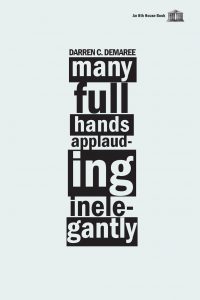
If I could give a lemon a day to Darren and have him prepare it for me in the same way he works on his sequences, I would know fully & intimately every nuance of lemon. Its sweetness, its sourness, its acidity, and its zest. Even the pulp, rind, and seeds would be realized before he’d shake his head one morning at the lemon – ready now for an onion and its mysteries.
Each of the sequences bears a tension of threat of violence (only certain birds gather when there’s violence – generally they all leave). In the first sequence, that threat often seems paired with the question of belonging. Sounds have shapes and barriers that take many forms and those creating the sounds and those listening then have very different relationships to these spaces. In #20, this comes to a head when the speaker says:
I have chosen not to join
the chorus, but to sing
quietly, so many songs
that it all becomes one note
slowly raised to live an inch
above my head
Sound also becomes devotion or spell work. The full weight of the poems is a flood – the reader is carried away by the weight of the poems, but neither the narrator nor the poet can feel truly part of the flood, its force.
In the “We Are Arrows” section, Demaree explores the threat of the projectile, as well as the glory of its flight. The poems, individually, are noticeably more definitive and declarative – forthright and proud even as they call into question the speaker’s and reader’s own volition to their actions. The verb to be resonates proudly even as issues of doubt and loneliness are explored.
In “All the Birds Are Leaving,” the reader is left with a nearly post-apocalyptic vision, as the wrestles for answers of big ideas of beauty, earth, and humanity’s purpose with little clues that are left behind – isolated. “As long as we are / singing about it, we / are not mourning” (#4). The narrator here practices the art of saying goodbye, acknowledging mistakes and graceful moments that have passed, yet made their mark. Saying goodbye may be the ritual to allowing a welcome again:
Danger frightens
the animals away,
but so does music,
great music, played
loudly, indifferent
of the audience
& that is renewal
as well, the clearing
& the celebration,
the dancing
& the slow return
of our own animal.
— (#93)
From many shifting shapes and senses, to many steadfast directions, to pieces leaving keys to rituals, Many full hands applauding inelegantly manages to be meditative and ponderous even as it is driven by a frenetic energy.
[alert type=alert-white ]Please consider making a tax-deductible donation now so we can keep publishing strong creative voices.[/alert]
